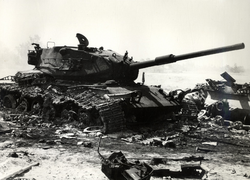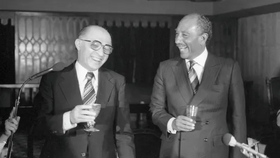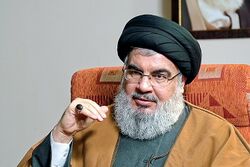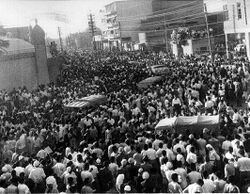Tsabaran Civil War
This article is incomplete because it is pending further input from participants, or it is a work-in-progress by one author. Please comment on this article's talk page to share your input, comments and questions. Note: To contribute to this article, you may need to seek help from the author(s) of this page. |
This article documents a current event. Information may change rapidly as the event progresses, and initial news reports may be unreliable. The last updates to this article may not reflect the most current information. (January 2020) (Learn how and when to remove this template message) |
The Tsabaran Political Crisis or Tsabara Crisis is an ongoing ethno-sectarian conflict and political crisis in Tsabara. It began in response to political reforms under President Atwan al-Tughluq, in which the ethno-sectarian balance of power and representation was undermined in favour of the Badawiyan Irfanic population. President al-Tughluq died on 7 October 2019 from a heart-attack. His death led to a powergrab by Premier Yahya Aboud and a subsequent escalation in tensions. The political tensions have been deepened by widespread sectarian and ethnic violence, that has left an estimated 300-1,100 people dead.
While inter-sectarian tensions existed prior to 2019 over the political agenda of Atwan al-Tughluq, subsequent reforms at the start of 2019, including the removal of Atudite justices from the Supreme Court and their replacement by Badawiyans and the introduction of pro-Badawiyan taxation policies led to a significant increase in actions by the Lions of the Homeland-Tsabara. Repeated government efforts to undermine the confessionalist system alienated many mainstream Atudite figures and politicians. Tensions were further enflamed by the rise of Badawiyan pan-irfanics within Tughluq's government. Anti-government protests in Atudite-majority areas began in the Spring of 2019, which were met with harsh police responses. In August, the situation escalated significantly with the 2019 Sfira Attack, in which Atudite military units of the Tsabaran Federal Army entered the military base, attacking the base commanders and taking the estimated 2,500 Badawiyan soldiers hostage. An estimated 111 Badawiyan soldiers were killed and led to negotiations between the Atudite attackers and the government. President al-Tughluq agreed to a series of concessions to avoid storming base in late August, before dying on 7 October.
Following al-Tughluq's death, Premier Yahya Aboud assumed the office of President, without relinquishing the office of Premier. This led to widespread condemnations by Atudite and Sotirian political parties, accusing Aboud of a powergrab. Mass anti-government protests broke out, while the situation in Sfira was left uncertain. Inter-ethnic and sectarian violence escalated significantly, while Pan-Irfanic factions began to agitate the Badawiyan population against the Atudites. On the 2 November, seven Atudite-majority states threatened to secede from the Tsabaran federation if Aboud did not step down and call elections.
Origins
Communalist regime
Following the collapse of the Atudite-Pied Noir government, due to Red September in 19XX, a popular revolution backed by left-wing military officers established the Communal Republic of Tsabara on 1 October 19XX. Under the leadership of the All-Tsabaran Party of the Left (ATPL) between 1948 and 1950, the national ideology of Communalism was developed. Communalism, a leftist ideology sought to "unify the peoples and races of Tsabara, through reason and leftist solidarity." This resulted in the creation of a single-party state and the adoption of draconian laws enforcing secularism. Communalism viewed religion as the principal obstacle to a united and harmonious Tsabara, while the Communalist regime also worked for over four decades to undermine ethnic identity alongside sectarian.
The Communalist regime enforced its anti-ethnosectarian policies harshly, pursuing members of the Atudite, Irfanic and Sotirian clergies. It imprisoned thousands of clerics, laypeople and shuttered hundreds of places of worship. The holy sites in Adunis were left untouched and all religious ceremonies were kept under tight surveillance and government control. Those who celebrated or advocated ethnic identities and customs were also ruthlessly punished, while the regime worked to established a singular Tsabaran identity.
Prominent Tsabaran historian, Michel Gemayel wrote in 2006: "the Communalist regime saw religion and racial identity as foolhardy and obstacles toward equalism, while simaltaneously, it saw them as threats to social harmony in Tsabara. It was double-edged sword, well meaning but only kicked the can of ethno-sectarian identitarianism down the road."
Between 1948 and 1986, the Communalist regime restricted civil liberties and freedoms, while its economic policy proved highly centralised and ineffective in alleviating inequality. Furthermore, its economic policy in some areas worsened the divisions between the Atudites and Badawiyans, as it used its petrochemical exports to fund development of the fast-growing coast. The lack of development of the interior and strict restrictions on internal migration, essentially "imprisoned the Irfanic-Badawiyan population in the destitute and backward interior", while enriching and improving the living standards of the Atudite-Sotirian coastal regions.

The decline of the Communalist regime began in 1975 with Tsabara's entry into the Irvadistan War, in support of its ally, the People's Republic of Irvadistan against the Union of Khazestan-Pardaran. During the four-year conflict, over 86,000 Tsabaran soldiers would be killed and 150,000 injured. The loss of life forged a long-sought after bond between Atudites and Badawiyans, though ironically, it led to united opposition to the Communalist regime. The war's human cost though heavy, fell far short of the economic cost - Tsabara's economy had all but collapsed in 1978 after a series of daring UKP air attacks on Tsabaran oil and gas facilities, as well as rail and road networks. Inflation skyrocketed, while the centrally-planned economy struggled to provide basic goods. Over the next seven years, sporadic armed uprisings by both Atudites and Badawiyans would undermine the integrity of the regime, mass protests and a general strike between 1983 and 1984 ultimately led to the peaceful transition to democracy .
Commentators and historians have noted that the systemic failures of the Communalist regime to reform the economy or use its vast oil revenues to develop the Badawiyan-dominated interior entrenched the dismal disparities in wealth and living standards. Its strict restrictions on internal migration maintained the stark divisions of ethnicity geographically speaking, while also denying Badawiyans access to the wealthy coastal areas. The involvement in the Irvadistan War devastated government budgets, which effected the Badawiyan population disporportionately, owing to their reliance on the weflare state. The war and subsequent resistance until 1986, led to a resurgence in ethno-sectarian idenities.
Democratic period (1986-2005)
During the negotiations for a peaceful transition to democracy, the Tsabaran League for Democracy under the leadership of Gideon Yadin and Mustafa Karim, began to develop a new constitution. In recognition of the Atudite-Pied Noir government and the efforts by the Communalists to unite society, the new constitution developed a confessionalist co-habitation system, in which offices of state would be shared equally between the "Three Peoples." The presidency, which would hold few executive powers would be held by a Badawiyan, the Premier would be an Atudite and the Speaker of the Assembly would be a Sotirian. The new Supreme Court would seat three Atudites, three Badawiyans and one Sotirian. This unique system ensured non-ethnic or sectarian political parties and promoted cross-sectarian political groupings.

In the 1986 elections, Karim was elected president, while Yadin became Premier. The Karim-Yadin government would hold power until 1994 when its term ended. Much of their agenda was focused on reconstructing the country's economy in wake of the political unrest of the 1980s and the damage suffered during the Irvadistan War. However, much like the Communalist regime, these efforts failed to address the significant levels of wealth disparity between Atudites and Badawiyans.
In 1994, Aryeh Katzir was elected president, while Abdulmalik al-Amari became prime minister. Al-Amari was senior figure in the TLD and a known critic of the new constitution - especially his criticism of the presidency being directly elected. Al-Amari also noted the new constitution's continued secular nature was doing little to stem the rise of religious idenities. In 1995, the constitution was reformed to have the president appointed by the Senate, while also introducing a sunset clause to the division of offices by ethnicity. Al-Amari saw the need in that "eventually, we will progress beyond this notion of segregation, insofar that we will trust any politician regardless of his or hers faith or race." The 1995 constitutional amendments would eventually lead to the rise of Atwan al-Tughluq and Yahya Aboud.
The Katzir-Amari government succeeded in dramatically improving basic services including; education, healthcare, vocational training and infrastructure. The greatly expanded civil liberties, while also rolling back some of the Communalist laws on secularism. However, their economic policy relied too heavily on oil revenues and the manufacturing of the coastal cities, further degrading the interior. Their embrace of big-business and support high-pay low-labour jobs further entrenched the oil-coast centric position, which would become the economic orthodoxy of successive Tsabaran governments. Subsequent free-market orientated reforms increased Tsabara's reliance on Euclean markets for its exports and strong economic growth, while this also made Tsabara more vulnerable to Euclean economic downturns.
The second term of the Katzir-Amari government saw further expansions of civil liberties and reductions in secularist laws, this enabled a return of informal influence by the Atudite and Irfanic clergy. In 1999, the government authorised the return of religious schools and the wearing of religious symbols and clothing. Sara Khateb, a prominent Tsabaran poet at the time wrote, "our democracy provides us with the dignity and rights long forbidden, yet, it does not provide us the dignity of food on the table, for many, the rights of liberty do not match the rights of prosperity." The reforms and the later 2005 Global Recession would prove devastating in popular support the young vibrant democracy, while also providing the atmosphere vital for the emergence of religious-populism and demagoguery.
In 2002, Ephraim Oren was appointed President and Saad Rajiha was elected Premier. Rajiah was publicly known as the "sheik in a suit" due to his fervant observation of Irfan and his government was swift to reduce secularism as much as constitutionally allowed, without amending the document. However, Rajiha was equally strong in his support for the confessionalist system and unified Tsabaran identity. His government contributed greatly into cultural programs and education, aimed at promoting progressivism and cohabitation. In 2005, President Oren resigned from office following the leaking of his extramarital affairs with a government aide. His resignation came three months before the sunset clause on the office-sharing amendment, in respect to clause, the Senate set about appointing a replacement. Atwan al-Tughluq was nominated by a group of Atudite and Badawiyan senators from the United Tsabara Party, his role as an activist military officer during the 1980s and his promises of working with the Premier to reform the economy saw him defeat Moshe Arad and becoming President.
Causes
Presidency of Atwan al-Tughluq
Failure to reform the economy
Pro-Badawiyan policies
Strongman rule
Constitutional weakenesses
Socioeconomic background
Tsabara stands as one of the most unequal societies in the world. Socioeconomic inequality was considered "concerning" by some economicsts under the Communalist regime, which failed to diversify the economy and remained reliant upon oil revenues throughout its existence. Industrialisation during the 1960s and early 1970s benefited the Atudite-Sotirian dominated coastal regions. However, inequality increased significantly after free market policies were initiated by the new democratic governments during the 1980s and 1990s, and it accelerated prior to the 2005 recession. With an emphasis on the service sector and manufacturing sectors, these policies benefited a minority of the nation's population, mostly the more developed and educated coastal regions, and members of the Irfanic merchant class of Qaa and Tebessa. In 2016, Tsabara's nominal GDP per capita was only $3,834 (on average), comparable to Bahian countries such as Habasha and far lower than its neighbors such as Zorasan. Per capita for the Atudite population was significantly higher at $13,503, while in coastal cities such as Elyakhin and Savyon it stands at almost $19,000. Also, with an annual growth rate of 4.39%, it falls below most other developing countries.
The country also faced particularly high youth unemployment rates among the Badawiyan population. At the start of the crisis, discontent against the economic situation was strongest in Tsabara's poor interior areas, predominantly among conservative Arta Irfanis. These included cities with high poverty rates, such as Tamanrasset and Hitteen, and the poorer districts of large cities.
Rise of Pan-Irfanism
Following Al-Tughluq's rise to the presidency in 2005, he brought with him elements of Political Irfan. Though driven by his desire for retaining office, his useage of political Irfanism as an electoral tool ultimately led to the rise of groups across the south and east aligned with his positions. The most prominent to emerge was Asa'ib Ahl al-Haq (League of the Righteous) in 2012, led by Faizan Salah. Other groups included the Association of Imam Ardashir, Imam Hussein Foundation and the Association of the Three Acts. Problematic for Al-Tughluq was that as he became more reliant upon these groups for mobilising the Irfanic religious vote, he became influenced by their agendas, which by 2018 had evolved toward Pan-Irfanism. These groups as a result came to advocate a closer relationship with Zorasan and came to view many minorities and the Atudites as "agents for Euclean influence."

Yehiel Bar a former leader of the Atudite People's Party wrote in 2018, "as the President smothers our democracy through his strongman antics, his ear has ever more strongly held by Arta Irfanic groups that seek to Irfanicise all of Tsabara. Worringly still, these groups are directly backed and funded by Zorasan." The rise of Arta Irfanic groups saw the spread of theological arguments that Adunis' control by Irfanics alone, would herald the first "success in averting the End-Times." Owing to the Eschatological focus of Irfan, many groups, AAH and ATA especially, have publicly advocated the eviction of Atudites and Sotirians from the holy city to enable an Irfanic renaissance.


